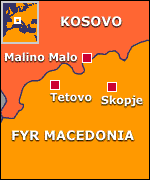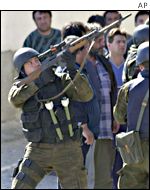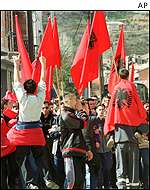Enter content here Germany sends tanks into Macedonia. Daily Telegraph By Anton La Guardia, Diplomatic Editor, and Hannah Cleaver in Berlin.
GERMANY was deploying tanks to the Macedonian town of Tetovo last night after a Bundeswehr soldier was wounded in intense fighting between Macedonian forces and Albanian rebels on the edge of the town.
Rudolf Scharping, the German Defence Minister, said: "We will not allow anyone to dance around our nose, Albanian terrorists included." He said two Leopard tanks were ordered to move to Macedonia from the Prizren barracks in Kosovo. The Bild newspaper reports in today's edition that tank units in Germany have been placed on 24-hour alert.
The tanks are the first front-line Nato combat forces deployed in Macedonia and mark another step in Nato's growing military involvement in quelling the rebellion there. Mr Scharping told ZDF television that Germany would "draw conclusions from the situation and use heavy weapons if necessary".
Amid fears that the fighting could plunge the region into another Balkan war, Greece has placed forces on the border with Macedonia on high alert, and has also offered military help to Skopje. Bulgaria is already providing military equipment and ammunition to the hard-pressed Macedonian forces, and has offered to send troops.
The Nato-led Kfor peacekeeping mission in Kosovo says it has no formal mandate to operate beyond the border, but maintains about 5,000 German soldiers in Macedonia to provide logistical support to Kfor. Nato officials said that it was unlikely that Kfor's mission would be extended to enter Macedonia or Serbia, where ethnic Albanians have also mounted attacks. But Kfor is increasing patrols on its side of the Kosovo border.
In a day of intense fighting, mortar rounds crashed into the centre of Tetovo yesterday, sending thousands of civilians fleeing to safety. Barracks on the edge of the town housing German and Macedonian troops came under fire and a German soldier was slightly hurt. A German Defence Ministry spokesman said: "We have 1,200 soldiers there. The injured man was hurt by flying glass after Albanians started shooting with small arms from the mountains." Macedonia simmers on brink of war. BBC Tetevo residents desperate to flee. Saturday, 17 March, 2001, 12:51 GMT
By Angus Roxburgh in Macedonia
The BBC isn't popular in Macedonia. We never are in an ethnic conflict.
Just by reporting one side's grievances, you're guaranteed to upset the other side.
In Macedonia, which broke away peacefully from the former Yugoslavia 10 years ago, there are fears the country is drifting into a bloody conflict between the majority Macedonians, who are Slavs and Christian, and the large ethnic Albanian minority who are Muslim.
Fighting broke out last week around the main Albanian city of Tetovo.
Poor Macedonia - it never had an ethnic conflict until a couple of weeks ago.
There was always some simmering discontent on the part of the ethnic Albanians who make up about a third of the population.  But the bloodshed that destroyed the rest of the former Yugoslavia had been avoided, and the Macedonian Government prided itself on that achievement.
Mountain hideout
Now, fomented by a self-styled Albanian National Liberation Army, that discontent could easily escalate into... dare I say it... another civil war in the Balkans.
I went to see some of these Albanian rebels in their hideout high in the mountains between northern Macedonia and Kosovo.
The village of Malino Malo - like several others in this border area - has been deserted by ordinary people.
Only the fighters are there, lounging with their rifles, or strutting around in their battle fatigues and balaclavas, pompously declaring their aim of winning by force of arms what a decade of political activity has failed to attain - equal constitutional rights for the Albanian minority.
Many people believe they really want to go further - and carve off a slice of Albanian-populated territory from Macedonia and create a Greater Albania.
Widening attacks
It's impossible to know how many rebels there are. They say thousands - perhaps it's just hundreds. But, ominously, as they widened their attacks during the past week, support for them among ordinary Albanians seemed to be almost universal.  A Macedonian soldier opens fire. "Of course we'll join them," young men in the city of Tetovo told me again and again, as the sounds of battle echoed in the hills just on the outskirts.
The Albanians' grievances are strong enough, but one can't help feeling they could have been dealt with through political dialogue, and a little bit of give and take by the Macedonians.
After all, an Albanian party is a member of the coalition government, so they're not without influence.
Diplomas not recognised
And their demands are not outrageous. Mainly they concern the use of Albanian, which is not recognised as a state language.
Everyone you meet complains that while the government funds two Macedonian-language universities, there is only a privately-funded Albanian one - and its diplomas are not recognised.
People complain that the police force is almost entirely Macedonian.
And it is absurd that in the Albanian city of Tetovo, if you end up in hospital, you're likely to have to talk to your doctors in a foreign language, Macedonian.
All of that seems simple enough to resolve. Except that the government is terrified that it will lead to a federal state and eventually the break-up of the country.
So the so-called National Liberation Army of Albanian militants has stepped into the vacuum, bringing the country within just a few weeks to the brink of disaster.  Ethnic Albanians in support of the rebels. The fighters use the mountain paths from Kosovo to bring in supplies on horseback. Many of the rebels appear to be veterans of the conflict in Kosovo itself.
Some of them are just thugs. When we returned from our overnight stay in Malino Malo, our car, which we'd left down in the valley, had been ransacked and mindlessly riddled with bullets.
But it's the Macedonians who bear the greatest grudge against the Western press - merely for reporting the Albanian side of the story.
Nervous police
On Thursday, when we tried to film Macedonian police firing at rebel positions outside Tetovo, we were repeatedly threatened by civilian vigilantes, some of them waving pistols at us.
The police themselves, seemed nervous - not to say petrified - as they faced the unexpected rebel assault.
With bullets zinging over their heads, they hid behind doorways and walls, firing back when they could but knowing they had nothing really to aim at, since the enemy was totally hidden in the densely wooded hillside.
The neighbourhood they were in was rapidly emptying. Its inhabitants, mainly Macedonians, were fleeing with a few possessions in plastic bags, running down the lanes and darting across open spaces exposed to snipers.
What a tragedy. And one that surely could have been avoided with just a few political concessions. Now, it's probably already too late for that. |



